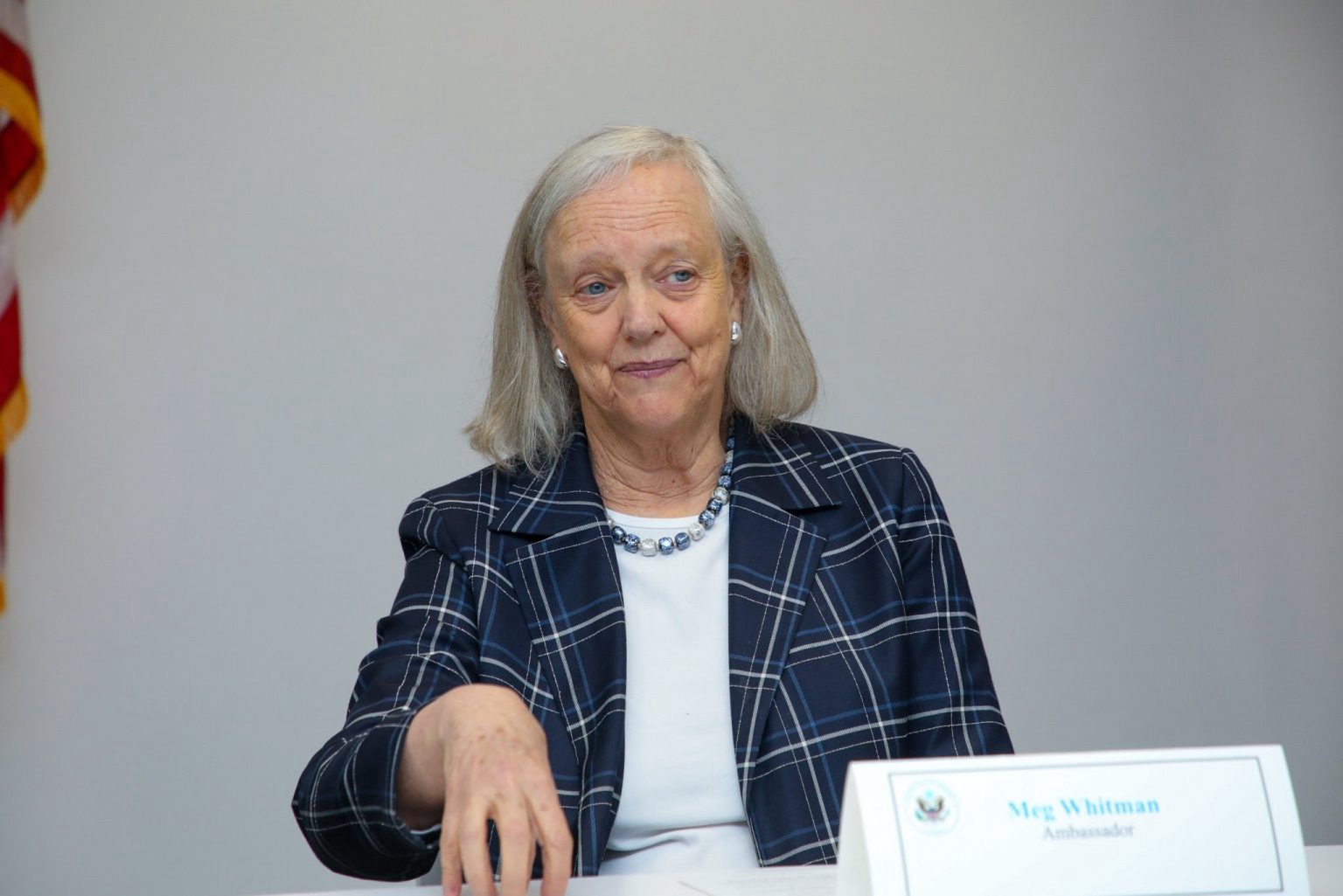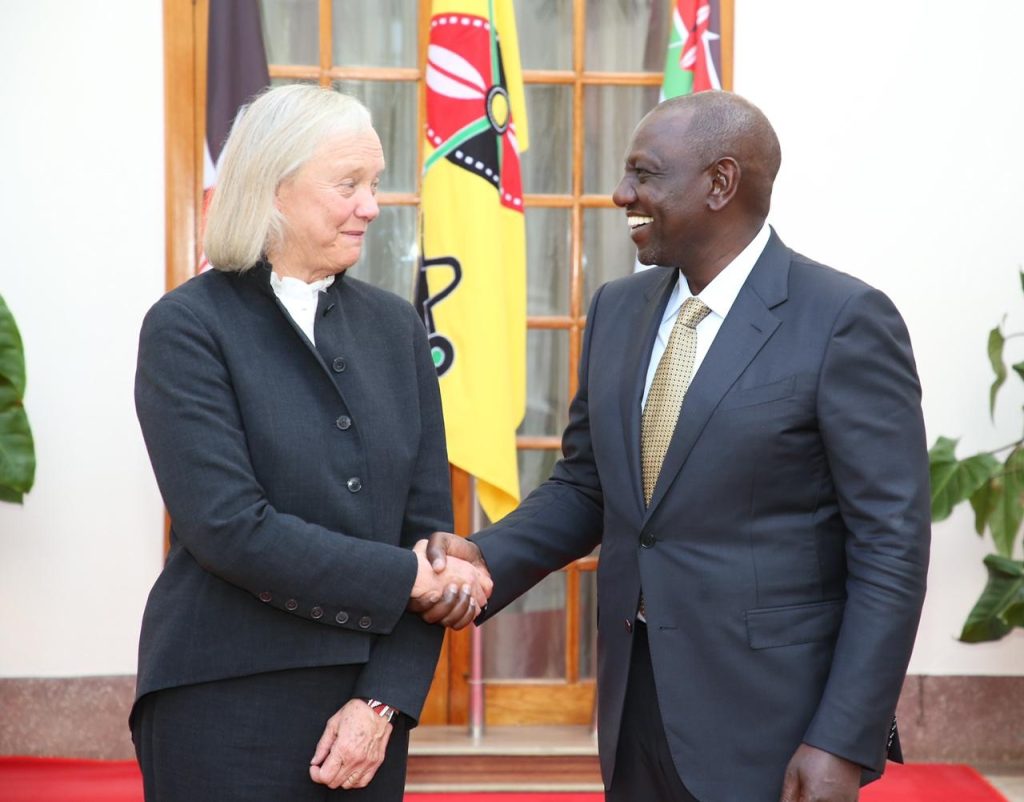Investigations
Former US Envoy Exposes How U.S. Ambassador Meg Whitman Allegedly Pushed Kenya Into Haiti’s “Cash Cow” Mission
Former President Joe Biden had pledged approximately $13 billion (Sh13 billion) to support the mission, representing a substantial influx of resources for Kenya’s cash-strapped government.

Explosive allegations emerge that former U.S. Ambassador to Kenya orchestrated controversial peacekeeping deployment for financial gain
A bombshell revelation has emerged about Kenya’s controversial deployment to Haiti, with a former U.S. diplomat alleging that then-Ambassador Meg Whitman single-handedly orchestrated the deal that would see Kenyan police officers leading a multinational mission in the gang-ravaged Caribbean nation.
Daniel Lewis Foote, who served as U.S. special envoy to Haiti in 2021, has made explosive claims that Whitman—who was U.S. Ambassador to Kenya from 2022 until last year—conceived and drafted the security agreement between Haiti and Kenya entirely on her own initiative, then successfully lobbied President William Ruto for his support.
The alleged architect behind the scenes
“From what I can tell, the US Ambassador to Kenya, Meg Whitman, came up with this idea on her own,” Foote stated during a recent interview on the Michael Patrick Leahy Show. His allegations paint a picture of diplomatic maneuvering that bypassed traditional channels and regional expertise.
The timing of these revelations is particularly striking, coming as Kenya’s mission in Haiti faces mounting challenges and questions about its effectiveness. The Multinational Security Support (MSS) mission, authorized by the UN Security Council in October 2023, has seen Kenyan police officers deployed to combat powerful gangs that control large swaths of Haiti’s territory.
A “cash cow” for poor nations?
Foote’s most damaging allegation centers on the financial motivations behind Kenya’s acceptance of the mission. He characterized the deployment as a “cash cow” for developing nations, drawing parallels to other countries that have historically participated in peacekeeping operations for economic benefits.

“That’s always great to have people making Latin America foreign policy from Africa,” Foote said with apparent sarcasm. “She got interest from President William Ruto of Kenya and it’s a cash cow for peacekeeping countries, particularly poor ones.”
The former diplomat pointed to Bangladesh, Pakistan, and Uruguay as examples of nations that have historically leveraged peacekeeping missions for financial gain, suggesting Kenya fell into the same pattern.
According to Foote’s account, the arrangement served multiple purposes: providing Kenya with substantial funding while offering President Ruto an opportunity to elevate his international profile.
“President Ruto wants to have a more international platform, etc., and the US is like, ‘great!’,” he explained.
The financial component is significant.
Former President Joe Biden had pledged approximately $13 billion (Sh13 billion) to support the mission, representing a substantial influx of resources for Kenya’s cash-strapped government.
Denials and diplomatic silence
When confronted with these allegations, Kenyan officials have pushed back strongly. Foreign Affairs Principal Secretary Dr. Korir Sing’oei dismissed Foote’s claims as “baseless,” though he provided no detailed rebuttal of the specific allegations.
More tellingly, the U.S. Embassy in Kenya has remained conspicuously silent. Despite being contacted for comment about Whitman’s alleged role in orchestrating the agreement, embassy officials provided no response, leaving questions about the diplomatic community’s knowledge of these arrangements unanswered.
This latest revelation represents the culmination of Foote’s sustained criticism of the Haiti mission. Since before the first Kenyan officers deployed in June 2024, he has consistently questioned both the motivations and preparedness of the operation.
His previous warnings included concerns about language barriers—noting that Kenyan officers would struggle to communicate with French-speaking Haitians—and assertions that the mission was inadequately planned. These concerns have proven prescient as reports of challenges on the ground continue to surface.
Regional dynamics and American interests
The allegations raise uncomfortable questions about American foreign policy decision-making in both Africa and Latin America. If accurate, they suggest a concerning pattern where regional expertise was sidelined in favor of expedient solutions crafted by officials with limited understanding of local dynamics.
Current Secretary of State Marco Rubio has since called for greater involvement from the Organization of American States (OAS), effectively acknowledging that the current approach may be insufficient. His recent testimony to the Senate Foreign Relations Committee emphasized the need for regional countries to take greater responsibility for Caribbean security challenges.
As the Kenya-led mission approaches its October 2025 deadline, these revelations add another layer of complexity to an already challenging situation. The UN Security Council must decide whether to transform the mission into a full UN peacekeeping operation or pursue alternative approaches.
Reports suggest that both China and Russia have expressed skepticism about the mission’s effectiveness, while gang violence in Haiti continues to escalate despite the international presence.
Beyond the immediate questions about the Haiti mission, Foote’s allegations highlight broader concerns about diplomatic accountability and the decision-making processes that commit nations to complex international interventions.
If a single ambassador could indeed orchestrate such a significant deployment without broader consultation or regional expertise, it raises serious questions about oversight mechanisms within the U.S. diplomatic apparatus.
As Kenya’s police officers continue their dangerous work in Haiti’s streets, the revelations about how they came to be there cast a shadow over the entire operation.
Whether driven by financial necessity, diplomatic ambition, or genuine humanitarian concern, the mission now carries the additional burden of questions about its origins and true purposes.
The silence from U.S. officials only amplifies these concerns, suggesting that the full story of how Kenya became entangled in Haiti’s security crisis may be far more complex—and troubling—than previously understood.
Kenya Insights allows guest blogging, if you want to be published on Kenya’s most authoritative and accurate blog, have an expose, news TIPS, story angles, human interest stories, drop us an email on [email protected] or via Telegram
-

 Business4 days ago
Business4 days agoCooking Fuel Firm Koko Collapses After Govt Blocks Sh23bn Carbon Deal
-

 Business3 days ago
Business3 days agoABSA BANK IN CRISIS: How Internal Rot and Client Betrayals Have Exposed Kenya’s Banking Giant
-

 Politics2 weeks ago
Politics2 weeks agoYour Excellency! How Ida’s New Job Title From Ruto’s Envoy Job Is Likely to Impact Luo Politics Post Raila
-

 Business2 weeks ago
Business2 weeks agoMinnesota Fraud, Rice Saga, Medical Equipment Deal: Why BBS Mall Owner Abdiweli Hassan is Becoming The Face of Controversial Somali Businessman in Nairobi
-

 Americas3 days ago
Americas3 days agoEpstein Files: Bill Clinton and George Bush Accused Of Raping A Boy In A Yacht Of ‘Ritualistic Sacrifice’
-

 News2 weeks ago
News2 weeks agoKenya Stares At Health Catastrophe As US Abandons WHO, Threatens Billions In Disease Fighting Programmes
-

 News2 weeks ago
News2 weeks agoDCI Probes Meridian Equator Hospital After Botched Procedure That Killed a Lawyer
-

 Investigations1 week ago
Investigations1 week agoPaul Ndung’u Sues SportPesa for Sh348 Million in UK Court, Accuses Safaricom Boss of Sh2.3 Billion Conspiracy















